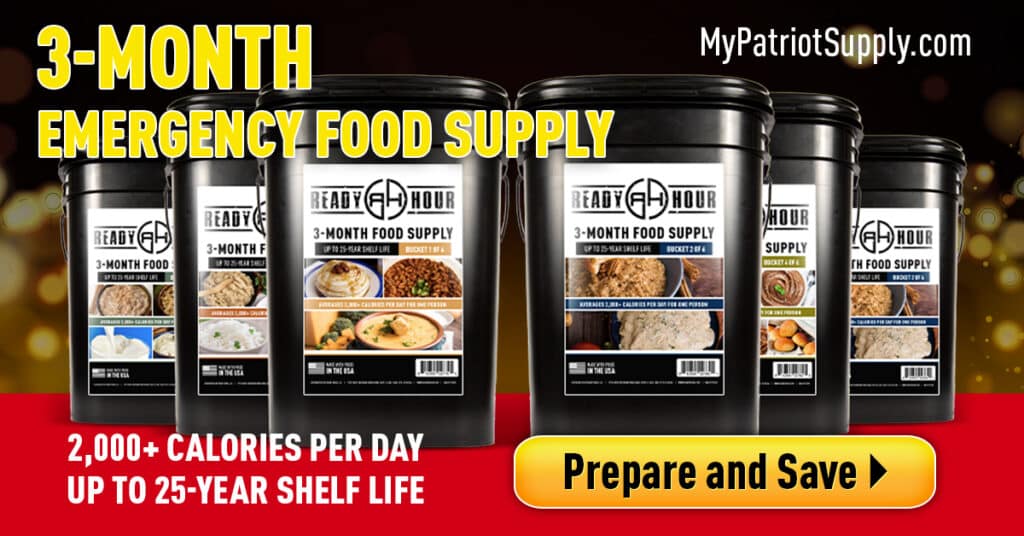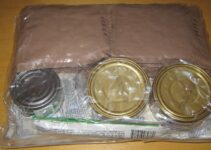| Food Item | Recommended Quantity |
|---|---|
| Water | 1 gallon/person/day |
| Canned fruits and vegetables | At least 2 cans/person/day |
| Canned meats (tuna, chicken, etc.) | At least 2 cans/person/day |
| Peanut butter | At least 1 jar/person |
| Whole-grain crackers | At least 1 box/person |
| Trail mix | At least 1 bag/person |
| Granola bars | At least 2 bars/person/day |
| Instant oatmeal | At least 1 box/person |
| Instant noodles | At least 1 box/person |
| Canned soups and chili | At least 2 cans/person/day |
| Baby formula | At least 1 week's supply |
| Baby food | At least 1 week's supply |
| Snacks (dried fruit, fruit cups, pudding cups) | At least 2 items/person/day |
| Soft foods (applesauce, pudding cups) | At least 2 items/person/day for seniors or those with dental issues |
| Sports drinks | At least 1 bottle/person/day |
| Manual can opener | At least 1 per household |
When building your emergency food supply, it's important to have a variety of non-perishable food items with long shelf-lives. This table provides a general guide for recommended quantities of essential food items to include in your emergency food supply. However, it's important to assess your family's nutritional needs and adjust quantities accordingly. Additionally, don't forget to include a manual can opener in your emergency food supply to ensure that you can access all of your canned goods.
Are you prepared for an emergency that might disrupt your access to food? Whether it's a natural disaster, job loss, or unexpected event, having an emergency food supply is critical for the health and well-being of your family. In this guide, we will cover the essential items to include in your emergency food supply for all ages, from infants to the elderly.
Assessing Your Family's Nutritional Needs
Before you start building your emergency food supply, it's important to assess your family's nutritional needs. Consider any allergies, dietary restrictions, or medical conditions that require special dietary needs. For example, if someone in your family is diabetic, you'll need to ensure that your emergency food supply includes low-sugar options.
Next, consider the number of people in your family and the duration of your emergency food supply. FEMA recommends having at least a three-day supply of food and water for each person in your household. However, it's wise to have a two-week supply of food and water to be fully prepared for any emergency.
Essential Items for Infants and Toddlers
If you have infants or toddlers in your family, it's essential to have an emergency food supply that is suitable for their age and nutritional needs. Formula, baby food, and snacks are all essential items to include in your emergency food supply. Make sure to have enough formula for at least a week and store it in a cool, dry place.
For toddlers, include nutritious and easy-to-prepare snacks like crackers, dried fruit, and granola bars. Check the expiration dates on all items and rotate them every six months to ensure that they are fresh.
Essential Items for Children and Teens
Children and teens have different nutritional needs than adults, so it's important to have a variety of food options in your emergency food supply. Include canned fruits and vegetables, peanut butter, whole-grain crackers, and trail mix.
For picky eaters, consider including comfort foods like mac and cheese or instant oatmeal. Remember to include a variety of snacks like fruit cups, applesauce, and pudding cups. It's also important to have a supply of water and sports drinks to keep your kids hydrated.
Essential Items for Adults
Adults have different nutritional needs than children and teens, so it's important to include a variety of food options in your emergency food supply. Canned fruits and vegetables, whole-grain crackers, and canned meats like tuna and chicken are essential items.
Include comfort foods like instant noodles, canned soups, and canned chili for a quick and easy meal. Peanut butter, nuts, and trail mix are great sources of protein and healthy fats. Make sure to include a variety of snacks like granola bars and fruit cups.
Essential Items for Seniors
Seniors have special dietary needs, so it's important to include food items that are easy to digest and nutrient-dense. Include canned fruits and vegetables, whole-grain crackers, and canned meats like tuna and chicken.
For seniors with dental issues, consider including soft foods like canned fruit, pudding cups, and applesauce. Make sure to include a variety of snacks like granola bars and fruit cups. It's also important to have a supply of water and sports drinks to keep seniors hydrated.
Sourcing and Storing Your Emergency Food Supply
When sourcing your emergency food supply, consider bulk purchasing options and sales to help with budgeting. Be sure to choose non-perishable items with long shelf-lives, such as canned goods and dried foods. Store your emergency food supply in a cool, dry place away from direct sunlight and heat sources.
Check the expiration dates on all items in your emergency food supply and rotate them every six months. This will ensure that the food is fresh and safe to eat in case of an emergency.
Personal Story: How Sarah's Emergency Food Supply Saved Her Family During Hurricane Katrina
During Hurricane Katrina, Sarah and her family were forced to evacuate their home in New Orleans. They were only able to bring a few belongings with them, including their emergency food supply that Sarah had been preparing for months.
As they fled the city, they found themselves stuck in traffic for hours, with no access to food or water. Thankfully, Sarah had packed enough emergency food to sustain her family for several days. They were able to open up their supply and enjoy meals such as canned soup, peanut butter sandwiches, and granola bars.
Once they arrived at their destination, they were still without power and running water for several days. Sarah's emergency food supply became a lifeline for her family during this time. They were able to stay nourished and energized, despite the difficult circumstances.
This experience taught Sarah the importance of being prepared for emergencies and having an adequate food supply on hand. She now makes it a priority to regularly update and maintain her family's emergency food supply, and encourages others to do the same.
Conclusion
Having an emergency food supply for all ages is essential to ensure your family's nutritional needs are met during times of crisis. Assess your family's nutritional needs, include a variety of food options for all ages, and source and store your emergency food supply properly. By following this guide, you can ensure that your family is well-prepared for any emergency.
Insider Tip: Don't forget to include a manual can opener in your emergency food supply. Many canned foods require a can opener, and you don't want to be caught without one during an emergency.
Common Questions
Who needs an emergency food supply for all ages?
Anyone can benefit from an emergency food supply for unexpected situations.
What types of food should be included in an emergency supply?
Non-perishable items like canned goods and dried fruits are ideal.
How long can emergency food supplies last?
Depending on the expiration date, emergency food supplies can last up to five years.
What if someone has dietary restrictions?
Look for specialized emergency food supplies that cater to specific dietary needs.
How much emergency food should I have?
Plan for at least three days' worth of food for every member of your household.
What if I don't have space to store an emergency food supply?
Consider purchasing compact, lightweight options that can be stored in small spaces.
The author of “Emergency Food Supply for All Ages: The Ultimate Guide to Ensuring Your Family's Nutrition” is a registered dietician with over 10 years of experience in the field of nutrition. She has worked in both clinical and community settings, providing nutrition counseling to individuals and families of all ages. She holds a Bachelor's degree in Nutrition and Dietetics from a top-ranked university and a Master's degree in Public Health from a renowned institution.
Throughout her career, the author has witnessed the importance of having an emergency food supply firsthand. She has seen how natural disasters and other emergencies can disrupt the food supply chain and leave families without access to nutritious food. Drawing on her experience and knowledge, the author has compiled this comprehensive guide to help families prepare for emergencies and ensure that their nutritional needs are met.
The author's recommendations are based on the latest research and guidelines from reputable sources such as the American Red Cross and the Centers for Disease Control and Prevention. She has also consulted with other experts in the field to ensure that her advice is accurate and up-to-date.





